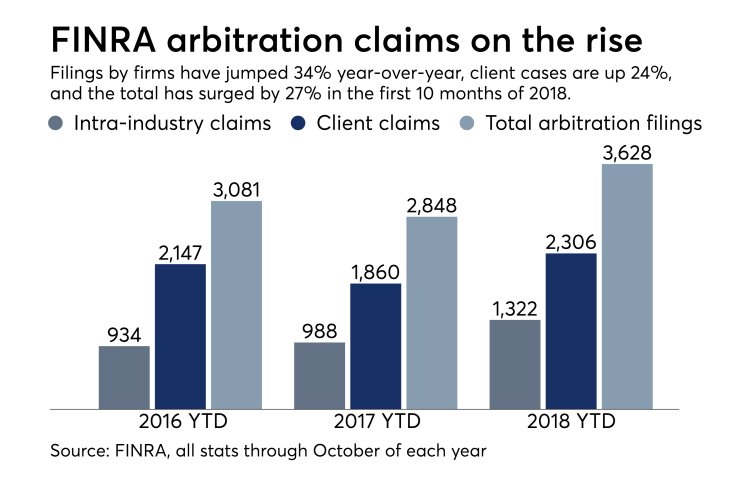A financial advisor won a $50,000 judgment from his former broker-dealer, gaining some vindication two years after Cambridge Investment Research permitted him to resign over block-trading allegations.
Cambridge and its chief risk officer, Seth Miller, sought more than $390,000 from Kermit G. Gable, Jr. in a FINRA arbitration filed after Gable had already been permitted to resign and suspended by Texas regulators. He allegedly failed to provide written statements about his block trades.
The Nov. 12

Gable, who also serves in the U.S. Army Reserves, declined to discuss the case when contacted at his Arlington-based RIA, Fidelis FS. In the arbitration, he had denied the company’s allegations and requested more than $100,000 in punitive damages, personal and attorney fees.
Cambridge spokeswoman Cindy Schaus said in an email that the firm respects the arbitration process but doesn’t comment on the details of cases. The firm requested compensatory damages, sanctions, attorney fees and other costs, along with an adverse inference against Gable.
In its October 2017 claim, Cambridge had accused Gable of breach of contract and indemnification based on its contention that his 2012 contract made him “obligated to reimburse and indemnify claimant in connection with payments” to the firm’s clients after its block-trading review.
Lewis says Cambridge’s claims display that it believed Gable’s conduct had forced it to pay related costs or a settlement of some kind, but the panel unanimously dismissed the firm's claims in their entirety and ruled that Gable should receive the award — plus 5% interest and about $7,000 in attorney fees.
It’s effectively “an unappealable decision” because of the requirement that the firm pay the award in 30 days, says Lewis.
“It’s very unlikely that the company would go that route,” Lewis says of any possible appeal. “You’ve got to be careful what you ask for, and the company asked for too much here. They would have been better off walking away from it.”
-
The broker misappropriated his clients’ investment money for rent, credit card bills and other personal uses, investigators say.
April 2 -
The board is calling for public comment on a variety of changes and released FAQs for planners about new standards of conduct taking effect next year.
November 27 -
Be careful when giving gifts over $100 in value.
November 27
Clashes over the Labor Department's fiduciary rule have carried over into the debate on the SEC's proposed regulation.
Cambridge had permitted Gable to resign in November 2016 “due to improper trading in client advisory accounts,” according to FINRA BrokerCheck. His separation from stemmed from a “disagreement with RIA concerning trade allocations between two family-related accounts,” Gable commented in a formal response to the disclosure.
In April 2017, Gable agreed to a disciplinary order with the Texas State Securities Board suspending him for 150 days. He failed to comply with requirements imposed on Cambridge advisors’ use of block trades, as spelled out in the firm’s SEC Form ADV,
To protect
“These requirements include the preparation of a written statement prior to entering the block trade that specifies the participating client accounts and how the advisor intends to allocate the order among the clients,” Texas regulators said in the disciplinary order.
Gable, the regulators went on, did not “prepare a written statement identifying the accounts that would participate in each trade prior to entering the trade in the block-trading account.”
The order also gave approval to Gable’s advisory registration with Fidelis, which reported $26.7 million in assets under management from 11 accounts in its latest ADV. Gable has not been registered with FINRA since he left Cambridge.
Other than Cambridge’s filing on his separation from the firm and the state regulator’s case, Gable has no other disclosures in three decades as an advisor. Also a commander in an Army Reserves detachment for engineers, he has disclosed his military service as an outside business activity in his form ADV filings since 2009.






